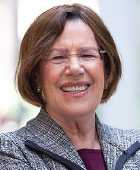Why Vote? Why Not?

“Voting is not only our right—it is our power,” said Loung Ung, a Cambodian American human-rights activist and former national spokesperson for the Campaign for a Landmine-Free World. In the middle of COVID-19, racism, climate change, and political upheaval, APA continues to address these challenges and actively engage with its members and the public. APA has the capability of meeting the challenges that it is facing now, and it will be facing in the future. Every member has the power to vote. Those who vote will determine the election. As Keith Ellison, Minnesota’s attorney general, said: “Not voting is not a protest. It is a surrender.” As many in the United States are concerned about voting rights and the outcomes of elections, APA is encouraging members to exercise their right to vote. Some APA members don’t vote because they are concerned about making a mistake.
These are two of the most frequent comments that I’ve heard:
Member: I’m too busy to vote, and I don’t know any of the candidates.
Me: I know that this year the candidates are restricted with regard to campaigning activities even more than in past years. But the election system had been unfair and inequitable. Equally qualified candidates did not have the same resources, including money, connections, and fame, so it was not a level playing field. APA leadership must become more diverse and inclusive. You can still review their platforms and biographies that will be sent to you in an e-newsletter and posted on APA’s website, participate in town halls in which the candidates will make presentations and answer questions (or watch the archived versions if you miss the live events), and make your choice. The personalized emails that will be sent to all voting members at the beginning of January to vote online with just a few clicks make it super easy to vote.
Member: I don’t vote because I’m not political, but I’m glad you are. I leave it to the politicos.
Me: Thanks, but to quote Michel Foucault: “The first task of the doctor is political—the struggle against disease must begin with a war against [unhelpful] policy.” Your vote essentially determines APA policy and psychiatry through the leaders who are elected.
APA is a democratic institution, that is, it is a system of governing entities of all the eligible voting members through its elected representatives. It is built on ideas, customs, and norms. One example of this was when APA applied to become an NGO of the United Nations in 2014. To be granted Special Consultative Status by the United Nations, APA had to demonstrate that it had democratic elections. However, the leaders of APA must be representative of all its members.
If members don’t participate in the greater whole, they relegate themselves to a functionary status. Being an APA member confers a responsibility to participate, like being a citizen in any democracy.
During this much-needed holiday season and an opportunity to get more engaged with family, friends, and community, don’t forget APA. Please take a few moments to make your voice heard. It is your right, your responsibility, and your power! ■
For more information on next year’s election, see the “Meet the Candidates for APA’s 2022 Election” page.



